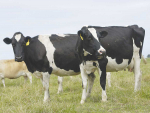The DairyNZ-led study says investment in a cow barn can only be profitable through more intensive farming, bringing in more cows and feed. However, a barn without intensification will result in a reduction in nitrogen losses but at a significant cost.
Intensifying the farm system to make the investment profitable can often result in a rapid erosion of environmental benefits.
The study collected data from five South Island farms running free stall barn systems – two in Southland and three in Canterbury.
DairyNZ senior economist Matthew Newman and AgFirst consultant Phil Journeaux last week presented the interim results of the study at the Australian Agricultural and Resource Economics Society’s (AARES) conference in Rotorua.
Newman says the jury is still out on whether investing in a wintering barn is a good financial or environmental move.
The study shows inclusion of a barn without intensification of the farming system may reduce nitrogen losses, but at a significant cost.
With good management and intensifying the farming system, the investment in a barn can be profitable but this is dependent on the milk price, feed costs and initial capital outlay, the study finds.
Intensifying the farm system to make the barn profitable often erodes the environmental benefits.
“Overall, the decision on a barn tends to be either/or – either you make money out of it or you reduce the environmental footprint of the farm. It is difficult to achieve both,” says Newman.
The study showed the farmers generally invested in wintering barns for farm management reasons such as reducing pugging of paddocks, better utilisation of supplementary feed, better control of grazing management and feeding, shelter for stock during poor weather, better working conditions and to reduce the cost of wintering cows over the winter. Financial and environmental considerations were well down the list.
For most farms, a barn incurred the high cost of more or new machinery and other farm infrastructure. However, the cost of similar barns varied a lot.
“Incorporating a barn changes the system and most of the farmers in the study were taking two to three years to adjust the system to a level they felt was appropriate. They require a change in management and often more attention to detail, particularly on nutrition,” says Matthew.
In general, farmers with barns were trading some of their climatic risks for financial risks, particularly servicing increased borrowings and sourcing appropriate supplementary feed, he says.











